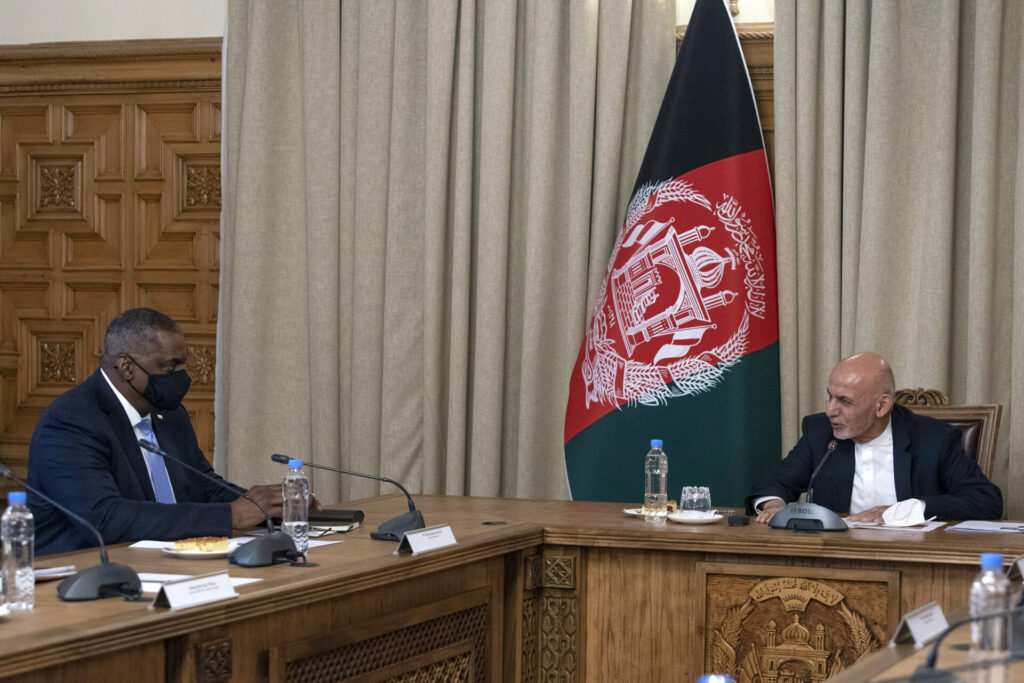Defense Secretary Lloyd Austin made an unannounced visit to Afghanistan over the weekend as the U.S. weighs the future of its troop presence and the risk of further territorial gains by the Taliban.
President Joe Biden is under pressure to decide whether to abide by an Afghan peace deal reached during Donald Trump’s final year that’s aimed at bringing home the roughly 2,500 U.S. troops by May 1. It’s a deadline — now just six weeks away — that Biden has said “could happen” but would be “tough” to meet.

Austin and Afghan President Ashraf Ghani met in Kabul on Sunday and discussed issues related to the peace process, a U.S. withdrawal and countering terrorism, deputy presidential spokesman Dawa Khan Menapal said. The visit wasn’t previously announced for security reasons.
Austin last month pledged a “thoughtful and deliberate” review of U.S. strategy in Afghanistan, saying there would be “no surprises” for the Afghan government or U.S. allies with troops in the country. Biden said last week he’s consulting with allies on the drawdown’s pace.
“I’m in the process of making that decision now, as to when they’ll leave,” Biden told ABC News. “That was not a very solidly negotiated deal that the president — the former president — worked out.”
Last year’s deal provided the opportunity to wind down the U.S. role on conditions that violence declined, the Taliban pledged to bar terrorist groups such as al-Qaida and Islamic State from operating in the country, and that the government and the Taliban entered into productive peace talks.
That process dragged out, but the Trump administration stuck with it. The Taliban, on the cusp of seeing foreign forces finally depart, largely held off on attacking Americans.
Even so, violence has climbed since peace talks started in September, including the targeted killings of journalists, civil-society members and politicians. In 2020, 8,820 Afghan civilians were killed or wounded, according to the United Nations.
The Afghan official in charge of conducting peace talks with the Taliban said the U.S.-backed government in Kabul is ready to discuss power-sharing with the Islamic movement.
“The idea of power-sharing, we agree that we will discuss it,” Abdullah Abdullah, a former Ghani rival who heads the government-appointed High Council for National Reconciliation, said in an interview in Moscow on Friday. “The percentage, the structure of power-sharing, this we will discuss with the Taliban.”
A cease-fire should also be agreed, he said.
Ghani has reacted coolly to U.S. proposals for an interim administration of national unity, saying elections are the only way to transfer power.
Previous peace efforts held in Doha, Qatar, between the Taliban insurgents and Ghani’s government have made little headway. The two sides, for example, needed months to agree on a basic outline of the talks.
Secretary of State Antony Blinken said in a letter to Ghani that even with continued U.S. financial aid, “the Taliban could make rapid territorial gains” if the U.S. withdraws and no agreement is reached between the Afghan government and the Taliban.
“I am making this clear to you so that you understand the urgency of my tone regarding the collective work outlined in this letter,” he said.
Austin’s stop in Afghanistan was part of a trip that also took him to Japan, South Korea and India.
___
© 2021 Bloomberg L.P. Distributed by Tribune Content Agency, LLC



